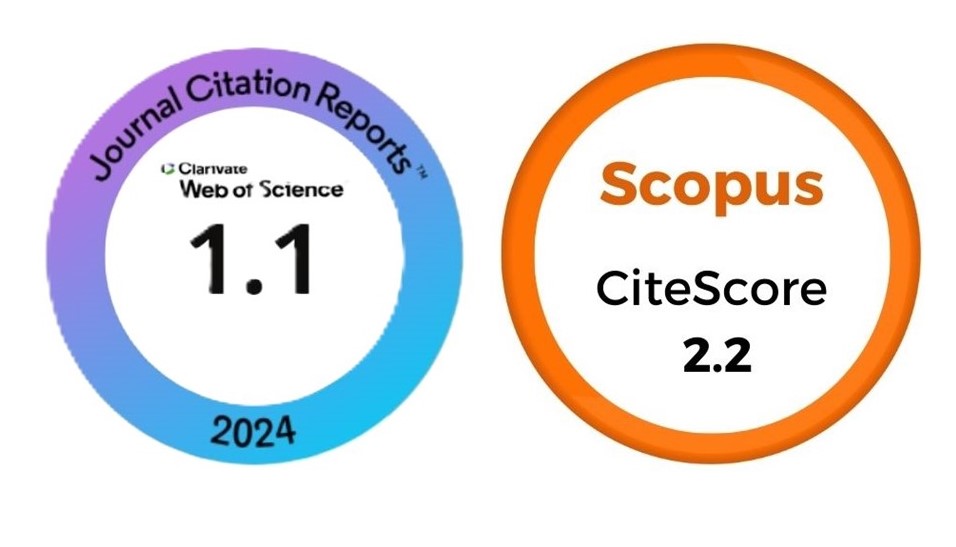Determining the phyllochron and final leaf pair number in on-farm cut dahlia cultivars
DOI:
https://doi.org/10.1590/2447-536X.v29i2.2650Keywords:
cut flower, Dahlia spp., leaf appearance, thermal timeAbstract
Dahlia is an important ornamental crop and widely used as a garden plant in beds and mixed borders as well as a cut flower in bouquets and flower arrangements. Understanding the factors that support sustainable flower production is essential for dahlia growers to increase their profits. Two key variables that define leaf development during the vegetative phase of a crop are the rate of appearance of leaves on the main stem and the final number of leaves. The objective in this study was to determine the phyllochron and the final leaf pair number (FLPN) in cut dahlias cultivars grown in different locations. Three on farm experiments varying from two to eight cut dahlia cultivars were conducted during two years (2021/2022) in six locations in Rio Grande do Sul State, Southern Brazil. The number of unfolded leaf pairs (NLP - an unfolded leaf was assumed when the foliolates edges were not touching anymore) on each plant was counted once or twice a week, depending on the farm, until the last leaf pair was unfolded. The NLP was linearly regressed against TT (thermal time °C day-1) and the phyllochron (oC day leaf pair-1) was calculated as the slope of the linear regression. The results indicated that the phyllochron of dahlia cultivars varied between 45.7 to 95.6 °C pair of leaves-1 and 8 to 14 of final number of pair of leaves in the first experiment, 27.2 to 97.4 °C pair of leaves-1 and 6 to 15 of final leaf pair number in the second experiment and 46.8 at 106.4 °C leaf pair-1 and 6 to 13 the final leaf pair number in the third. Thus, there was no significant difference between the sites in the phyllochron and NFP variables.
Downloads
References
ARNOLD, C.Y. Maximum-minimum temperatures as a basis for computing heat units. Proceedings of the American Society for Horticultural Sciences, v.76, n.1, p.682-692, 1960.
BAJARAYA, B.; KANAWJIA, A.; JAYSAWAL, N.; DUBEY, A.; PARVEEN, S.; PAWAIYA, S. Performance of different cultivars of Dahlia (Dahlia variabilis L.) under agro-climatic conditions of Gwalior. Journal Pharmacogn Phytochem, v.7, n.6, p.98-102, 2018.
BRONDUM, J.J.; HEINS, R. D. Modeling temperature and photoperiod effects on growth and development of dahlia. Journal of the American Society Horticultural Science, v.118, n.1, p.36-42, 1993. https://doi.org/10.21273/JASHS.118.1.36
BUFFON, P.; FERREIRA LIMA, E.; FRESINGHELLI NETO, J.; TOMIOZZO, R.; TEIXEIRA SCHWAB, N.; AUGUSTO STRECK, N. Desenvolvimento de statice de corte irrigada em diferentes épocas de cultivo em Santa Maria/RS. Anais do Salão Internacional de Ensino, Pesquisa e Extensão, v.11, n.2, 2020.
CAMERA, D. de O.; LUDWIG, M.P.; MARTINS, J.D.; KIRCHNER, J.H.; SANTOS, M.S.; VILLA, B. Phyllochron variability and cutting management practices on the agronomic potencial of sorghum (Sorghum bicolor (L.) Moench). Colloquium Agrariae, v.19, p.86-104, 2023. https://doi.org/10.5747/ca.2023.v19.h515.
FRANK, A.B.; BAUER, A. Phyllochron differences in wheat, barley and forage grasses. Crop Science, v.35, n.1, p.19-23, 1995.
GILMORE, E.C.Jr.; ROGERS, J.S. Heat units as a method of measuring maturity in corn. Agronomy Journal, v.50, n.10, p.611-615, 1958.
GOERGEN, P.C.H.; LAGO, I.; SCHEFFEL, L.G.; ROSSATO, I.G.; ROTH, G.F.M.; DURIGON, A.; POHLMANN, V. Development of chia plants in field conditions at different sowing-date. Comunicata Scientiae, n.13, e3723, 2022. https://doi.org/10.14295/CS.v13.3723
HERMES, C.C.; MEDEIROS, S.L.; MANFRON, P.A.; CARON, B.; POMMER, S.F.; BIANCHI, C. Emissão de folhas de alface em função da soma térmica. Revista Brasileira de Agrometeorologia, v.9, n.2, p.269-275, 2001.
HODGES, T. Predicting crop phenology. Boca Raton: CRC, 1991. 233p.
KIRBY, E.J.M. Environmental factors influencing the phyllochron. Crop Science, v.35, n.1, p.11-19, 1995.
KLEPPER, B.; RICKMAN, R.W.; PETERSON, C.M. Quantitative characterization of vegetative development in small cereals grains. Agronomy Journal, v.74, n.5, p.789- 792, 1982.
KOEFENDER, J.; STRECK, N.A.; BURIOL, G.A.; TRENTIN, R. Estimating the phyllochron in calêndula. Ciência Rural, v.38, n.5, p.1246-1250, 2008.
KOTTEK, M.; GRIESER, J; BECK, C.; RUDOLF, B. World map of the Koppen-Geiger climate classification updated. Meteorologische Zeitschrift, v.15, n.3, p.259- 263, 2006. https://doi.org/10.1127/0941-2948/2006/0130.
KUINCHTNER, A.; BURIOL, G.A. Clima do estado do Rio Grande do Sul segundo a classificação climática de Köppen e Thornthwaite. Disciplinarum Scientia, Série: Ciências Exatas, v.2, n.1, p.171-182, 2001.
KUMAR, N.; PRASAD, V.M.; YADAV, N.P. Effect of chemical fertilizers and bio fertilizers on flower yield, tuberous root yield and quality parameter on dahlia (Dahlia variabilis L.) cv. Kenya Orange. Journal of Pharmacognosy and Phytochemistry, v.8, n.4, 2019.
OLIVEIRA, G.; ARENHARDT, E.G.; PACHECO, M.T.; FEDERIZZI, L.C. Filocrono, soma térmica e número de folhas no início do florescimento de aveia branca em condições ambientais distintas. Comissão Brasileira de pesquisa de aveia. Ijuí: Universidade Regional de Ijuí (UNIJUÍ), 2018.
ROSA, H.T.; WLATER, L.C.; STRECK, N.A.; ALBERTO, C.M. Métodos de soma térmica e datas de semeadura na determinação de filocrono de cultivares de trigo. Pesquisa Agropecuária brasileira, v.44, n.11, p.1374-1382, 2009.
SHUKLA, P.; PRASAD, V.M.; BURONDKAR, S.S.; AINARKAR, A.A. Evaluation of dahlia hybrids (Dahlia variabilis L.) under Allahabad agro climatic conditions. Pharmacogn Phytochem, v.7, n.5, 1109-113, 2018.
STRECK, N.A.; BELLÉ, R.A.; BACKES, F.A.A.L.; GABRIEL, F.K.; UHLMAN, L.O.; BECKER, C.C. Desenvolvimento vegetativo e reprodutivo em gladíolos. Ciência Rural, v.42, n.11, p.1968-1974, 2012. https://doi.org/10.1590/S0103-84782012001100010
STRECK, N.A.; BELLÉ, R.A.; HELDWEIN, A.B.; BURIOL, G.A.; SCHUH, M. Estimating the phyllochron in lily (Lilium longiflorum Thunb.). Revista Brasileira de Agrometeorologia, v.12, n.2, p.355-358, 2004.
STRECK, N.A.; BELLÉ, R.A.; ROCHA, E.K., SCHUH, M. Estimating leaf appearance rate and phyllochron in safflower (Carthamus tinctorius L.). Ciência Rural, v.35, n.6, p.1448-1450, 2005.
STRECK, N.A.; MICHELON, S.; ROSA, H.T.; WALTER, L.C.; BOSCO, L.C.; PAULA, G.M.; CAMERA, C.; SAMBORANHA, F.K.; MARCOLIN, E.; LOPES, S.J. Filocrono de genótipos de arroz irrigado em função de época de semeadura. Ciência Rural, v.37, n.2, p.323-329, 2007.
STRECK, N.A.; UHLMANN, L.O. Flowers for all; bridging the gap between science and society. Chronica Horticulturae, v.61, n.3, p.32-34, 2021.
THE NATIONAL DAHLIA SOCIETY. Dahlia: Overview / Classification / Family Tree / Species / Cultivation. West Midlands, Englad: National Dahlia Society, 2021. Available at: https://www.dahlia-nds.co.uk/about-dahlias/ overview/. Accessed on: July 30, 2022.
UHLMANN, L.O.; BECKER, C.C.; TOMIOZZO, R.; STRECK, N.A.; SCHONS, A.; BALEST, D.C.; BRAGA, M.S.; SCHWAB, N.T.; LANGNER, J.A. Gladiolus as an alternative for diversification and profit in small rural property. Ornamental Horticulture, v.25, n.2, p.200-208, 2019. https://doi.org/10.14295/oh.v25i2.1541.
UHLMANN, L.O.; STRECK, N.A.; BECKER, C.C.; SCHWAB, N.T.; BENEDETTI, R.P.; CHARÃO, A.S.; RIBEIRO, B.S.M.R.; SILVEIRA, W.B.; MUTTONI, M.; PAULA, G.M.; TOMIOZZO, R.; BOSCO, L.C.; BECKER, D. PhenoGlad: A model for simulating development in Gladiolus. European Journal of Agronomy, v.82, p.33- 49, 2017. https://doi.org/10.1016/j.eja.2016.10.001
WILHELM, W.W.; McMASTER, G.S. Importance of the Phyllochron in studying development and growth in grasses. Crop Science, v.35, n.1, p.11-19, 1995.
Downloads
Published
Issue
Section
License
Copyright (c) 2023 Ornamental Horticulture

This work is licensed under a Creative Commons Attribution 4.0 International License.








